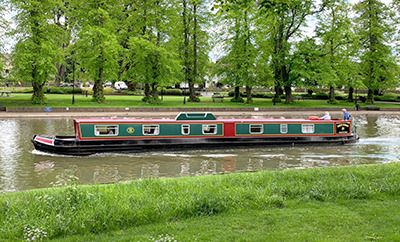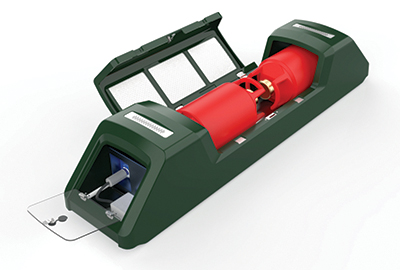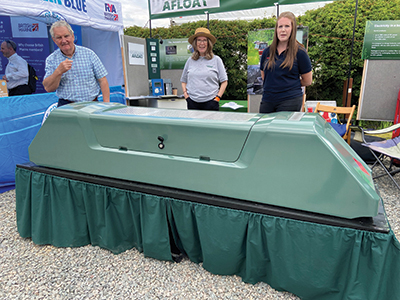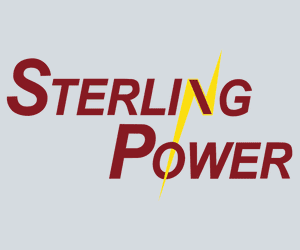Profiles: Company Profiles
Hydrogen Afloat
Is hydrogen power the future of boating?
Tony Jones met up with Hydrogen Afloat’s Nick Swift at this year’s Crick Boat Show to hear about his plans to develop a domestic fuel which is convenient, socially responsible and environmentally friendly. And there’s a way you could benefit too.
Hydrogen power has long been lauded as a viable alternative to fossil fuels, but it hasn’t really begun to make waves in the boating market – until now. Nick Swift has been working in this field since 2019 and is currently involved in a ground-breaking project developing hydrogen-powered trains to replace diesel-powered trains. Interestingly, many of the challenges facing the rail industry are also issues for boaters on the inland waterways. That’s why Nick is also developing hydrogen-fuel-cell technology for boats. We were keen to find out more.

Hi Nick, how might a hydrogen fuel system be useful to boaters?
All boats use electrical power for appliances such as fridges, water pumps, lights and entertainment equipment. So if the boat isn’t hooked up to a mains supply, this power must be generated and then stored in batteries. Using solar power to charge batteries during the summer is easy, at least for those boaters who have sufficient solar panel coverage. However, during the winter months, charging batteries using solar power isn’t a reliable option. Instead, most boaters will either run their engine or use a generator to charge their battery bank, and that’s where the problems occur.
I think I can guess, but what problems are we talking about here?
Well, there are several, but let’s start with the use of fossil fuels. We don’t need to go into much detail, but suffice to say that there’s a gradual and Government-mandated shift away from fossil fuel use across all modes of transport. The boating world is slowly transitioning.
Then there’s the noise generated by engines and generators which is not only annoying for the person on the boat, it’s also annoying for neighbours aboard other boats and those living or working in nearby properties too. Which dovetails neatly into the issues caused by the carbon monoxide, smoke and particulates produced by engines, generators and solid-fuel stoves. Many local authorities are bringing in measures to reduce noise and environmental air pollutants, and it’s something that’s already affecting the waterways.
How does a hydrogen system combat these issues?
First of all, a hydrogen system is essentially silent, apart from a very low hum and an occasional hiss, so that’s the noise issue sorted. However, the most important benefit is the elimination of exhaust fumes. A hydrogen cell can recharge a battery bank with zero carbon emissions, making it an ideal fuel for use in built-up areas. With hydrogen, there’s no pollution at the point of use, and that’s a major game changer.

You have the HyArk hydrogen system for boats on display here at the show today. How does that work?
The HyArk is a hydrogen fuel unit which sits atop the roof of a boat and provides power to charge the battery bank. It can supply 12V or 24V, and it has a management unit which can be set to adapt to whatever type of battery is being used. Think of it as electricity in a bottle.
It’s quite a large unit. Does that cause any problems?
Of course, you’ll need sufficient roof space. And while the unit does fit under the vast majority of bridges you’ll need to remove it to go under some of the notoriously low ones on the system – just as you would with the chimneys, bicycles and satellite systems many boats have on the roof. Replacing the gas bottles won’t be much of a task for most people. At 21kg the hydrogen bottles are much lighter than a typical 13kg bottle of LPG, which are more like 30kg or more when you include the weight of the bottle and gas together. The weight of the gas itself is only half a kilo – so light it’s not easy to tell when a bottle is empty or full.
Can the unit be fitted inside the boat?
No. Hydrogen is lighter than air. In fact, it’s so buoyant it rises at around 40mph when it is released and is one of just a few gases light enough to leave the earth’s atmosphere. It’s also flammable with a low ignition point and no smell, so it’s not suited for storage in enclosed spaces such as boats. Storing it on the roof means any unintentional release will naturally and safely disperse.
What other safety considerations are there?
The HyArk has a sensor which will shut down the fuel cell if a leak is detected, and the system also features material which swells if there’s a boat fire, thereby protecting the fuel cell and storage cylinders.
What feedback have you had from the boaters you met at the show?
There’s a lot of interest and the reasons why people are attracted have been various. We’ve spoken to people about the obvious noise and pollution benefits, and about the convenience of being able to use the HyArk at night when you can’t run engines or generators.
We’ve also spoken to people about how the system can help them to prolong the life of their batteries. Boat battery systems often suffer from insufficient charging because most boaters won’t want to run engines or generators long enough to fully replenish their battery bank. This causes the batteries to degrade over time, sometimes within just a year or two. With a hydrogen system in place the batteries can remain topped up without having to worry about the noise and pollution caused by running engines.
How about the comparable costs? Is using hydrogen cheaper or more expensive than charging batteries with the engine or a generator?
The cost is significantly higher – at the moment. The hydrogen bottles are currently only available from one supplier so they have a monopoly at present, although other suppliers are getting ready to enter the market. Also, there aren’t many people using hydrogen, so demand is low and supply costs are high. As more people begin to use it the costs will of course fall.
However, we believe that having such a convenient, clean and quiet power source available as a backup is attractive enough for some people to not be concerned about the current costs. Boaters moored in urban areas will often find that running engines is annoying and socially unacceptable, so hydrogen offers a perfect solution. New boat-owners spending £150k on a boat probably aren’t going to be too worried by the £7k installation cost to have a HyArk fitted, and the benefits of having a worry-free source of power is worth it, we believe.
We realise we’re probably two or three years early for the mass market, but we’re confident that there will be enough early adopters who value the benefits. These early adopters will be the catalyst to help bring prices down.
Hydrogen is being marketed as an environmentally friendly fuel. Can you tell me more about that?
At the moment most hydrogen in the UK is made using fossil fuel, so it’s known as grey hydrogen and isn’t particularly environmentally friendly. However, that situation looks set to change. It’s entirely possible to use renewable energy sources to make hydrogen by electrolysis. This is known as green hydrogen and is infinitely more environmentally friendly. We need to create sufficient demand for green hydrogen for suppliers to invest in the facilities to make it. Whichever type of hydrogen we use there is no pollution at the canalside, but when green hydrogen is locally produced from renewable sources then we have a truly zero-carbon energy solution.
We’re currently on a journey and we have a classic chicken and egg situation. We can’t just wait until we have a reliable supply of green hydrogen, because that won’t happen if there is no demand. We are talking with a couple of potential hydrogen providers who are considering entering the small, portable cylinder market, and they would offer green hydrogen. So, we’re certainly on the road to decarbonising.

Perhaps this is an opportunity for marinas to get involved and produce hydrogen on-site?
Absolutely. The technology is certainly available. Producing hydrogen at the point of sale, rather than shipping it across the world, makes it truly sustainable, and it’s entirely possible for marinas to do this if they make the investment. Wind, solar or hydropower from rivers are all possible sources of energy which could be used to produce green hydrogen. This isn’t likely to be something that happens soon, but once the demand is generated then the local generation and sale of hydrogen could be an attractive proposition. I can certainly foresee hydrogen bottles being delivered and sold via the current coal-boat network.
I understand you’re working with local authorities in London to address the air-quality issues caused by boaters in the capital. What’s going on there?
There’s increasing scrutiny of boaters in London. Clean air restrictions are something which will affect boater behaviour more and more as the Ultra Low Emission Zone becomes increasingly effective at cleaning up road vehicle emission issues. From this year London construction sites come under air quality restrictions. I think it is only a matter of time before this is applied to London’s canals and rivers.
The Department for Business, Energy and Industrial Strategy (BEIS) runs a funding scheme to support net-zero innovation projects to accelerate their commercialisation, and we are seeking to build a consortium of stakeholders to bid for funding next year. Our plan aims to fund a quantity of HyArk units to liveaboard boaters in London and assess the benefits in terms of improvements in air quality, noise reduction and quality of life. The project is called ‘Hy-City Living’. If anyone is interested in being included in the scheme we would be delighted to hear from them. We aim to involve a university and schools in the scheme to spread an understanding of fuel cells, but also the importance of our urban waterways and how they form an important resource for all, including those who live aboard.
To my mind the canal is a perfect environment for this initiative to succeed because hydrogen can provide clean and convenient energy. The canals are places to live and exercise, and they’re an essential haven and habitat for wildlife. Boating will need to be considerate of that, so a low noise, low-carbon fuel which doesn’t pollute the environment seems a sensible way to go.
Presumably there’s an opportunity for boat-builders to profit from hydrogen?
Yes, from both a new build and retro-fit perspective. Here at the show we spoke to several boat-builders on the VIP Trade Day and invited them to visit our stand. Predictably, with the show being so busy, it was difficult for many of them to get away and dedicate time to looking around. But by the Sunday we were having boat-builders come to see us, saying they’d had enquiries from people who had visited our stand asking if they might be able to build a boat with a hydrogen power system. We spoke to several builders at length and the response was encouraging – particularly from those with a focus on the environmental and social issues of boating.
So what happens next?
We predict a gradual uptake of hydrogen fuel use on the waterways over the next couple of years when we expect to see a tipping point reached to make the fuel much cheaper for the consumer to purchase.
It’s only really a matter of time before the diesel and coal we rely on at the moment become unavailable for one reason or another, so we need to be moving away from these fuels sooner rather than later. As I said previously, we’re on a road towards that carbon-zero goal and we’re excited to see what the future will bring.



